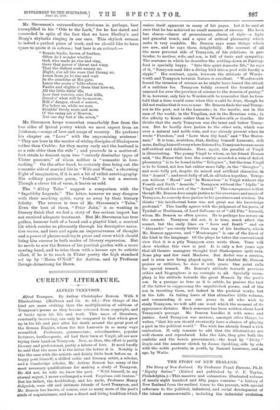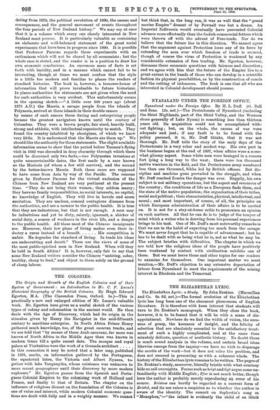dating from 1870, the political revolution of 1890, the causes
and consequences, and the general movement of events throughout the four periods of New Zealand history." We may say at once that it is a volume which every one closely interested in New Zealand must possess. It is particularly valuable as containing an elaborate and well-balanced statement of the great social experiments that have been in progress since 1890. It is possible that Professor Parsons regards these experiments with an enthusiasm which will not be shared by all economists ; but the whole case is stated, and the reader is in a position to draw his own economic conclusions. An enormous mass of facts is set forth with lucidity, and in a manner which cannot fail to be interesting, though at times we must confess that the style is a little too modern and familiar to please the readers of standard histories. The book is, however, a treasure-house of information that will prove invaluable to future historians. In places authorities for statements are not given when the need for such authorities is very evident. This unfortunately occurs
in the opening sketch A little over 500 years ago (about 1875 A.D.) the Maoris, a savage people from the islands of
Polynesia, arrived at these islands in their double canoes by means of such canoes these daring and enterprising people became the greatest navigators known until the century of Columbus. They were a brown people, fair sized, heavily built, strong and athletic, with intellectual superiority to match. They found the country inhabited by aborigines, of which we know very little. It is understood that the Maoris ate them up." We should like the authority for these statements. The slight available information seems to show that the period before Tasman's flying visit in 1692 was shrouded in deep obscurity through which there could be discerned only two facts,—two Polynesian invasions at quite unascertainable dates, the first made by a race known as the Morioris (of whom a few still survive), and the second by the better-known Maoris. Both these races are supposed to have come from Asia by way of the Pacific. The reasons given by Professor Parsons for the virtual exclusion of the Chinese from Now Zealand are very pertinent at the present time. "They do not bring their women; they seldom marry ; they have no family responsibilities, no social interests, no capital, no knowledge of English. They will live in hovels and scorn sanitation. They are unclean, conceal contagions diseases from the authorities, and are a menace to the public health. It is true that they are industrious, but that is not enough. A man may be industrious and yet be dirty, miserly, ignorant, a shirker of social duty, a source of weakness in the civic life, and a danger to the public health. All these most of the Chinese immigrants are. Moreover, their low plane of living makes even their in-
dustry a curse instead of a benefit His competition is
unfair. He degrades the standard of living In trade his ideas
are undercutting and deceit." These are the views of some of the most public-spirited men in New Zealand. When will they be held in South Africa? It is, however, only fair to say that some New Zealand writers consider the Chinese "untiring, sober, healthy, cheap to feed," and object to them solely on the ground of cheap labour.
THE COLONIES.
The Origin and Growth of the English Colonies and of their System of Government an Introduction to Mr. C. P. Lucas's Historical Geography of the British Colonies. By Hugh Edward Egerton, M.A. (The Clarendon Press, Oxford. 55.)—This is practically a new and enlarged edition of Mr. Lucas's valuable work. Mr. Egerton here gives us a useful sketch of the various types of colony and colonisation in the ancient world. He then deals with the Age of Discovery, which had its origin in the stimulus given by Henry the Navigator in the mid-fifteenth century to maritime enterprise. In North Africa Prince Henry gathered much knowledge, too, of the great caravan tracks, and we are told that "by means of these Arab caravans, far more was known of North Africa in the Middle Ages than was known in modern times till a quite recent date. The mosque and royal palace at Timbuktoo were the work of a Granada architect. . . in this connexion it may be noted that a later map, published in 1591, marks, on information gathered by the Portuguese, the equatorial lakes, the Victoria and Albert Nyanza, to- gether with lake Tanganyika, whose existence was unknown to more recent geographers until their discovery by snore modern explorers." Mr. Egerton passes from the Spanish and Portu- guese Colonial Empires to the colonising work of Holland and France, and finally to that of Britain. The chapter on the influence of religious dissent on the foundation of the Colonies is one of value and interest, while modern Colonial economic ques- tions are dealt with fully and in a weighty manner. We cannot
NYASALAND 'UNDER THE FOREIGN OFFICE.
Nyasaland under the Foreign Office. By H. L. Duff. (G. Bell and Sons. 120. net.)—The Protectorate of Nyasaland (including the Shirt Highlands, part of the Shirt Valley, and the Western shore generally of Lake Nyasa) is nomething less than thirteen years old. Its acquisition could not be accomplished with- out fighting ; but, on the whole, the causes of war were adequate and just ; if any fault is to be found with the policy pursued, it is, Mr. Duff thinks, that it was not thorough. Mr. Duff tells the story of the early days of the Protectorate in a very sober and modest way. His own part in the business began at the end of 1897, when affairs wore a some- what gloomy aspect. Some white men were besieged in a remote fort lying a long way to the west; there were ten thousand native warriors in the field, and the Protectorate army numbered less than one thousand, Sikhs led by British officers. But dis- cipline and machine guns prevailed in the struggle, and when Mr. Duff reached Zomba the danger was over. Happily, his ONV11 subject is not military operations, but the aspect and resources of the country ; the conditions of life as a European finds them, and the state of the native population; the organisation of their tribes, social and political ; their characteristics, physical, intellectual, and moral ; and most important, of course, of all, the principles on which European administration of their affairs is to be carried on. It is not for a stay-at-home critic to pronounce an opinion on such matters. All that he can do is to judge of the temper of mind which a writer who is drawing from his personal experiences brings to his task. One of Mr. Duff's most noteworthy remarks is that we are in the habit of expecting too much from the savage. We must never forget that he is capable of advancement ; but he has to be dealt with as being what he is, not as what he may be. The subject bristles with difficulties. The chapter in which we are told how the religious ideas of the people have positively been weakened by contact with civilisation exhibits one of these. But we must leave these and other topics for our readers to examine, for themselves. One important matter we must mention,—Mr. Duff's objection to any extensive deportation of labour from Nyasaland to meet the requirements of the mining interest in Rhodesia and the Transvaal,
THE ELIZABETHAN LYRIC.
The Elizabethan Lyric: a Study. By John Erskine. (Macmillan and Co. 6s. Od. net.)—The formal evolution of the Elizabethan lyric has long been one of the obscurest phenomena of English literature. It is therefore with keen interest that students will turn to Dr. Erskine's monograph. When they close the book, however, it is to be feared that it will be with a sense of dis- appointment. Nowhere do we find the width of vision, the sure- ness of grasp, the keenness of insight, and the felicity of selection that are absolutely essential to the satisfactory treat- meat of such a highly complicated, and at the same time minutely delicate, question of aesthetic history. No doubt there is much sound analysis in the volume, and certain broad ideas likewise emerge from the inquiry—we have no wish to disparage the merits of the work—but it does not solve the problem, and does not succeed in presenting us with a coherent whole. The history of the Elizabethan lyric remains to be written. The pageant Dr. Erskine's study, moreover, literally bristle with what courtesy bids us call oversights. Forms such as brigt and ligt argue some un- familiarity with Middle English ; Pfor is not much better, though here the author is probably merely reproducing an error of his source. Bristow can hardly be regarded as a current form of Bristol, and its use raises a suspicion as to whether the author is aware of the identity. The remark on Sephesties song in "filenaphon,"—" the infant is evidently the child of an illicit



























































 Previous page
Previous page